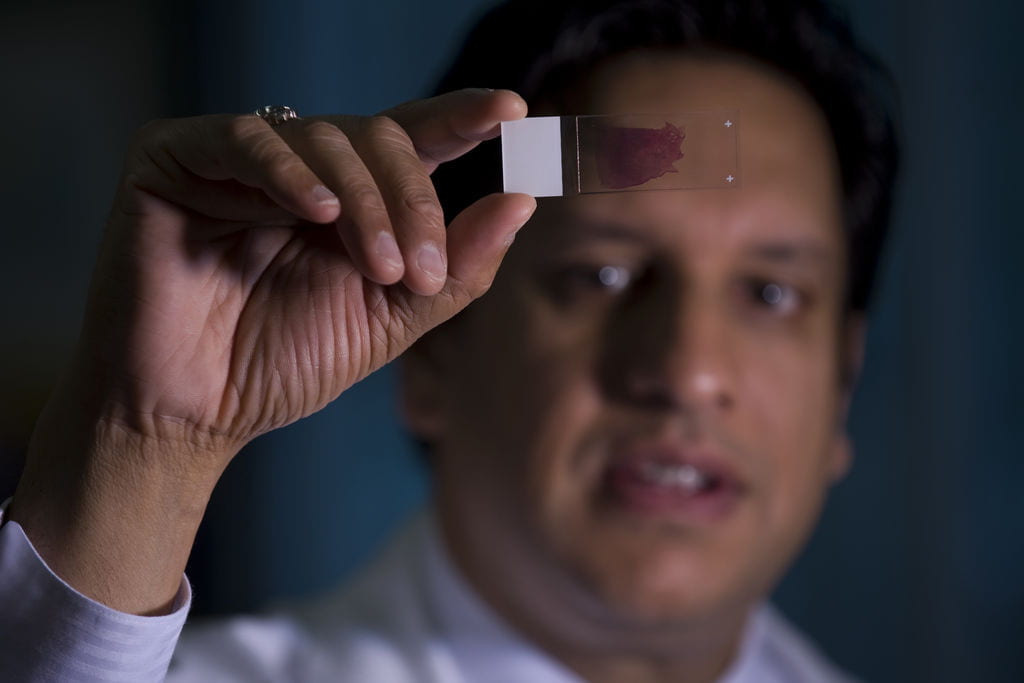Overcoming ovarian cancer
UCI’s gynecologic oncology group forges what is being called the largest breakthrough for treating ovarian cancer in more than a decade.

At a Chao Family Comprehensive Cancer Center faculty retreat 12 years ago, two young UC Irvine oncologists proposed a new approach to fighting ovarian cancer, which kills about 15,000 American women each year.
Three clinical trials later, Dr. Robert Burger and Dr. Bradley Monk’s idea of supplementing chemotherapy with Avastin – a drug already touted for its ability to battle other cancers by blocking blood vessel growth in tumors – is being hailed as the biggest advance in gynecologic oncology in nearly 14 years.
At the annual meeting of the American Society of Clinical Oncology in early June, Burger – who left UCI for Philadelphia’s Fox Chase Cancer Center in 2008 – presented positive results (video) from the nationwide Phase III Avastin clinical trial. Ovarian cancer treatment may never be the same, says Dr. Krishnansu Tewari, who led UCI’s participation in the trial.
“If approved for use by the Food & Drug Administration, Avastin will change the standard of care for ovarian cancer,” he says. “This is a significant breakthrough that potentially could save the lives of thousands of women.”
A Phase III trial, usually involving large patient groups at several medical centers, is designed to be the definitive assessment of a drug’s effectiveness. It’s often the last of a multiphase process before a pharmaceutical is reviewed by a regulatory agency like the FDA. The initial protocols for the Avastin trials were developed at UCI by Burger and Monk.
The Avastin approach is the latest success story for UCI’s gynecologic oncology team, widely considered a U.S. leader in finding and testing new cancer treatments.
A division of the university’s nationally ranked Department of Obstetrics & Gynecology, the gynecologic oncology group hosts one of the most active research programs in the country. Since 1993, its faculty members have published more than 230 articles in peer-reviewed research journals, and, according to Tewari, it currently oversees about 20 clinical trials. The unit also manages one of the few National Cancer Institute-funded fellowship training programs for gynecologic oncology in the U.S.
“The cancers our group fights — including ovarian, uterine, cervical and endometrial — strike at a woman’s very core: her reproductive organs,” Tewari says.
Complicating matters, he adds, each type has unique signs and symptoms, risk factors and prevention strategies. They’re also deadly: Statistics show that of the 76,000-plus American women diagnosed annually with gynecologic cancers, nearly 28,000 succumb to their disease.
UCI oncologists have taken prominent roles in supporting and directing efforts to change this.
Division director Dr. Philip DiSaia is chair of the Gynecologic Oncology Group, part of the Coalition of Cancer Cooperative Groups. The national coalition was established in 1997 to improve the cancer clinical trials system by streamlining and promoting studies in both the public and private sectors. DiSaia’s group helps guide a majority of large-scale clinical trials related to gynecologic cancers, and it was the primary sponsor of the Avastin work.
Tewari heads a UCI-led consortium of 11 medical centers — including those at UC San Diego, UC San Francisco and Stanford University — that combine resources to support gynecologic oncology trials. He’s currently conducting a nationwide Phase III trial to see how Avastin can improve cervical cancer outcomes.
“I can’t think of another gynecologic oncology group that has accomplished as much as UCI’s,” Tewari says. “We have the infrastructure and expertise in clinical trials. The foundations of our division include these trials, drug discovery, translational science and robotic surgery. All those elements are found in abundance at UCI.”
“I believe our program is among the finest anywhere,” DiSaia adds. “We do an excellent job treating patients day to day.”